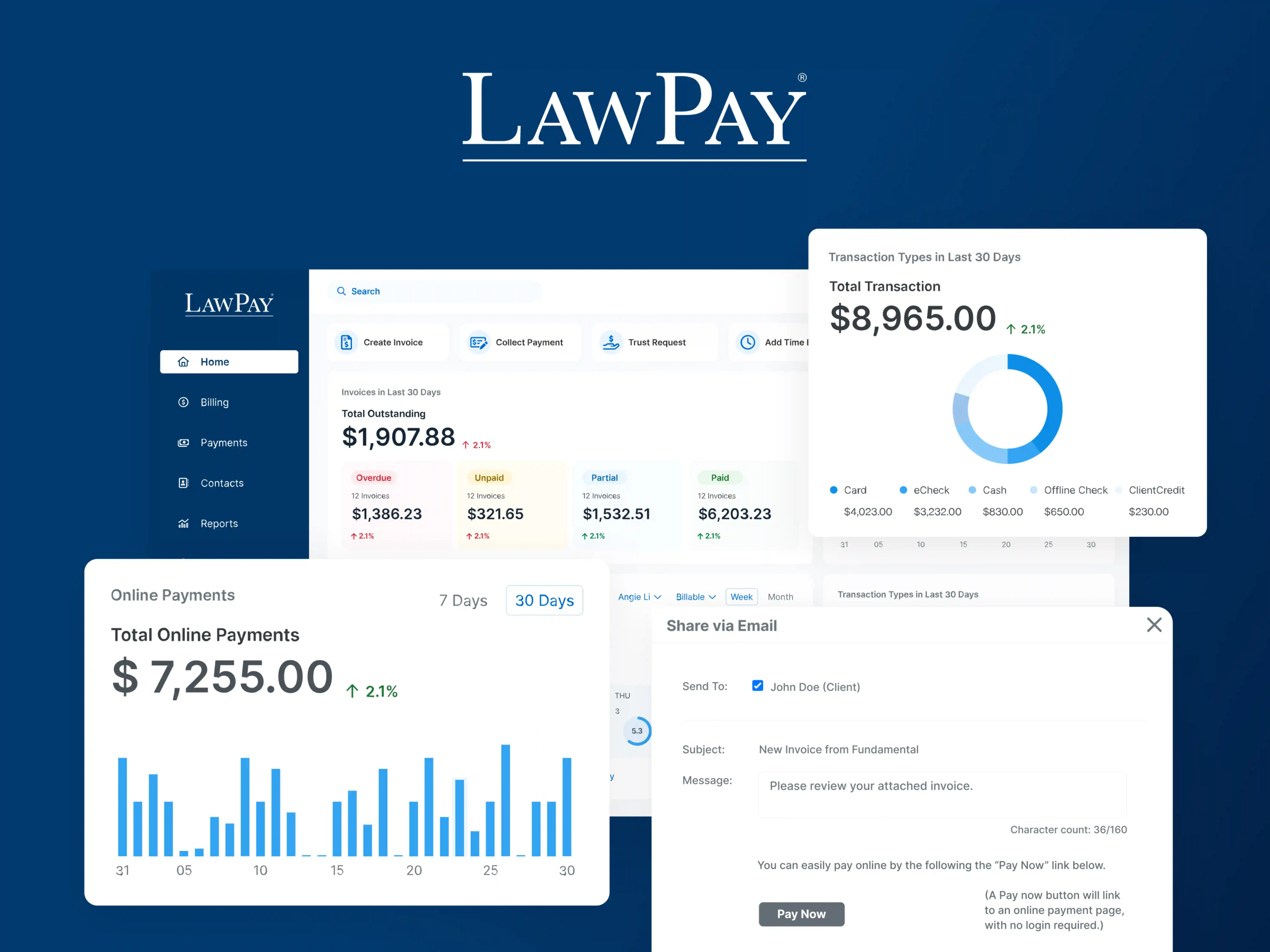With clients preferring credit card payment options over cash and debit, credit card surcharges have become an attractive model for legal professionals to offset processing fees at their firms. However, credit card surcharge laws vary by state and require considerable research before implementing them in your practice.
In this article, we’ll explain everything you need to know about credit card surcharges, including which states allow them under state law (and which do not), how to implement them, and the regulations that must be followed. Attorneys are also subject to ethics rules and should check with their local bar association for the most updated information applicable to them.
Schedule a demo to see what LawPay can offer your firm.
Book Now
What Is a Credit Card Surcharge?
Each time a merchant accepts and processes a credit card transaction, they pay a processing fee to the appropriate financial institution. A credit card surcharge (or cc surcharge) is a fee enforced by the merchant to compensate for some of the cost of payment processing. This fee can only apply to credit cards—and never debit, even when a debit card is run like a credit. As for calculating the fee, surcharges are predominantly percentage-based.
Let’s look at an example.
Imagine a local dentist’s office that typically processes in-person payments. If a patient requests to pay over the phone, the office may implement a convenience fee of $1.95.
Now, in the same office, a credit card surcharge may look like this:
When the patient chooses to pay with credit, their bill will reflect a 2% cc surcharge for services rendered. The patient is made aware of the surcharge and the fee is calculated from the total cost.
Credit card surcharge (or cc surcharge):A fee enforced by the merchant to compensate for some of the cost of payment processing.
Are Credit Card Surcharges Legal?
If you’re wondering if it is legal to charge credit card fees, the short answer is yes in most states.
The practice of surcharging was largely outlawed for several decades until 2013 when a class action lawsuit permitted merchants in several U.S. states to implement surcharges in their businesses.
This lawsuit sparked a chain reaction in the following years as more states adopted a pro-surcharging stance. Proponents of surcharging have argued that anti-surcharging laws drive up prices for goods and services across the board and, in some cases, may even be a violation of the First Amendment.
Credit Card Surcharge Laws by State
The legal landscape of credit card surcharging fluctuates, but as of February 2024, credit card surcharging is legal in most states. However, there are nuances to be aware of.
In some of the states below, there may be certain restrictions on credit card surcharging (based on state attorney general guidance or bar rules)—and in others on the list, anti-surcharging laws still exist but aren’t necessarily enforceable as a result of recent court decisions:
California
Georgia
Indiana
Iowa
Michigan
Ohio
Oklahoma
Pennsylvania
Texas
Note: Surcharges are governed by state law and card brand rules (like those published by Visa and Mastercard), each of which are subject to change. Attorneys are also subject to ethics rules and should check with their local bar association for the most updated information applicable to them. The following list, updated as of February 2024, provides legal professionals with updated information on the legal status of credit card surcharges specifically based on state law.
States Where Credit Card Surcharges Are Legal
States A-L | States M-O | States P-Z |
Alabama | Maryland | Pennsylvania |
Alaska | Michigan | Rhode Island |
Arizona | Minnesota | South Carolina |
Arkansas | Mississippi | South Dakota |
California | Missouri | Tennessee |
Colorado | Montana | Texas |
DC | Nebraska | Utah |
Delaware | Nevada | Vermont |
Florida | New Hampshire | Virginia |
Georgia | New Jersey | Washington |
Hawaii | New Mexico | West Virginia |
Idaho | North Carolina | Wisconsin |
Illinois | North Dakota | Wyoming |
Indiana | Ohio | |
Iowa | Oklahoma | |
Kansas | Oregon | |
Kentucky | ||
Louisiana |
States Where Credit Card Surcharges Are Illegal
Currently, credit card surcharging is illegal in the following states and territories:
Connecticut
Maine
Massachusetts
New York (as currently interpreted)
Puerto Rico
As of February 11, 2024, it is illegal for New York merchants to separately list the pre-surcharge subtotal or even the separate line item surcharge amount. As mentioned below, listing the surcharge as a line item is required to comply with card brand rules. This means that, as of the time of writing, New York conflates “surcharging” with what is generally understood by the payments industry to be a cash discount model, while effectively banning “surcharging” as that term is understood by the industry and card brands. Local governments are authorized to enforce the law while keeping the proceeds, and each violation carries a fine of up to $500. This article provides detailed analysis regarding the specific restrictions and open questions arising from the new law in New York.
Credit Card Surcharging Rules
Major credit card institutions, such as Visa and Mastercard, set forth rules and regulations for merchants to follow when implementing surcharges. While there are slight variations among brands, general rules remain universal.
Below, we'll break down the most common rules for legal professionals to follow when executing surcharges at their firm. We’ll also explain how LawPay can help your firm comply with these rules quickly and easily, so you can focus on doing what matters most: practicing law.
Notify the Credit Card Institution
You must notify major credit card institutions—in writing—about your intent to surcharge. You may write a letter to your financial account representative or file paperwork provided on the credit card's website.
If you use a legal payment solution for credit card processing, like LawPay, support teams can initiate the notification process on your behalf, saving you the first step in the process.
Notify Your Clients
Your clients must also be made aware of your intention to surcharge. This must be written out plainly, not immersed within a lengthy contract or disguised by the fine print.
You may accomplish this by including the credit card surcharge on your invoice or displaying a sign at your office. If you're using an online payment solution, this notice should be automatically included on your payment page.
Ultimately, the credit card surcharge cost is passed to the client, so it is crucial to communicate your process effectively to ensure a smooth process and positive client experience.
Do Not Surcharge More Than the Cost of Your Processing Fee
This rule stipulates that you cannot use surcharging as a means to make a profit. In general, a surcharge cannot exceed 3% in the U.S.
In Colorado, merchants may either: (1) surcharge a maximum of 2%, or (2) charge the actual cost the company pays for credit processing. Because the actual cost varies by each merchant and transaction, most providers in Colorado cap surcharging at 2% where enabled.
To learn more about specific stipulations in Colorado, this article details CO Credit Card Surcharge Laws.
Do Not Implement Surcharges on Debit Card Transactions
Surcharge fees are strictly limited to credit card transactions only. Even if a client wishes to run a signature debit transaction, where a debit card is processed as a credit transaction, you are still not allowed to implement a surcharge.
Surcharges are also not applicable to prepaid cards.
List Surcharges as Separate Line Items
When drafting an invoice and tallying up transactions, you cannot lump in the surcharge to the total cost of the service. Each surcharge must be listed separately on your invoice and labeled clearly as a surcharge.
This practice reinforces transparency and makes it clear to clients that they are being charged an additional fee for using a credit card. It also simplifies the reconciliation process for lawyers, as it allows for easy tracking and recording of processing fees.

Stay PCI Compliant
While not a surcharging rule per se, Payment Card Industry (PCI) compliance is an important credit card payment rule that businesses should be aware of.
Put simply, if your firm accepts credit card payments, you must remain compliant with the Payment Card Industry Data Security Standard, or PCI DSS. This is a set of security standards established by the major card brands that ensures all companies accepting, processing, storing, and transmitting credit card information are maintaining a secure environment to prevent stolen or compromised information.
This is a set of security standards established by the major card brands that ensures all companies accepting, processing, storing, and transmitting credit card information are maintaining a secure environment to prevent stolen or compromised information.
As a result, your firm must complete an annual compliance questionnaire regarding the way your office handles credit card information.
Fortunately, LawPay makes it easy to complete your questionnaire via our user-friendly, custom-built PCI compliance program for customers. Available at no extra charge with a LawPay account, this questionnaire typically takes just five to 10 minutes to complete.
LawPay’s platform is regularly evaluated by independent auditors to ensure we meet Level 1 Service Provider standards for PCI DSS compliance—the highest security level available. We’re passionate about using our expertise in the payment industry to help your firm ensure compliance as well.
Schedule a demo to see what LawPay can offer your firm.
Book Now
Simplify Surcharge Implementation and Compliance with a Legal Payment Processor
Surcharge compliance is ever-changing and anything but simple to navigate. But it doesn't have to be a point of stress for your firm.
Legal payment processors can alleviate the burden of surcharge compliance by helping your practice to follow the latest card brand rules and debunking any credit card myths that might arise.
At LawPay, we're committed to ethical and secure credit card processing for law firms. Whether you prefer to charge in-person or online (by computer, tablet, or mobile phone), we'll help you give clients more options to pay—with each method adhering to credit card surcharge laws.
In fact, while other payment processors might offer the option to add an additional fee as a “surcharge” to invoices, LawPay’s surcharge feature is designed to align with card brand rules—auto-detecting debit cards and making sure to never apply a surcharge in those cases. Attorneys should check with their local bar association for applicable rules on surcharging.
Additionally, all payment processing is integrated into our legal invoicing capabilities for a seamless, end-to-end billing and payment experience. We are one of the few legal payment processors to offer a complete invoicing and billing solution with card brand-focused surcharging capabilities.
To learn how LawPay can help your firm implement hassle-free credit card surcharges, schedule a demo today!
About the author

Gabriela JheanContent Writer
Gabriela Jhean is a Content Writer for leading legal software companies, including MyCase, Docketwise, CPACharge, CASEpeer, and LawPay—the #1 legal payment processor. She covers emerging legal technology, financial wellness for law firms, the latest industry trends, and more.
